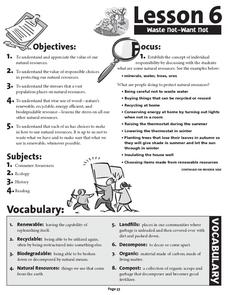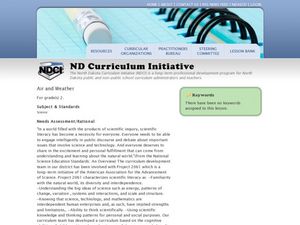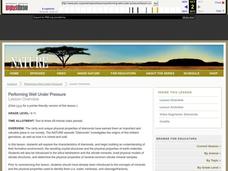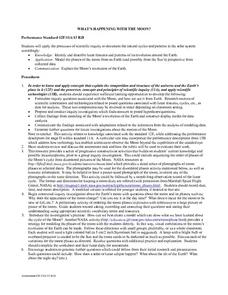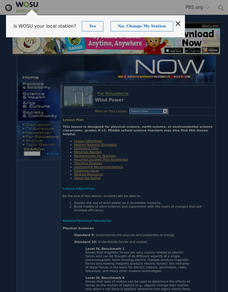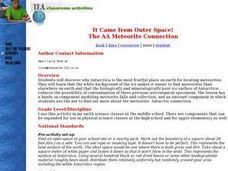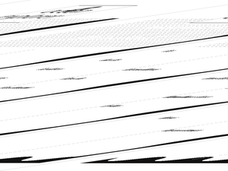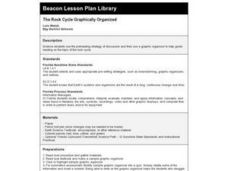Curated OER
Water: Our Most Important Beverage
Third graders complete a KWL chart on what they already know about water and what they want to know. As a class, they participate in an activity in which they discover the amount of drinkable water on Earth and are introduced to the...
Curated OER
Tetonic Plates and Faults
Students understand the basic properties of plate motion. They demonstrate what happens to a plate while faulting while using manipulatives. They demonstrate the Nature of Scientific Inquiry to solve scientific issues.
Curated OER
Waste Not Want Not
Students are introduced to the need to save natural resources. Through inquiry, hands-on activities, and problem solving, students increase their understanding of solid waste materials and the need to reduce, recycle, and reuse.
Curated OER
Air and Weather
Second graders study Earth's materials. In this air and weather instructional activity, 2nd graders note changes in the weather and examine tools that help us study the weather. Students analyze how changes in the environment make...
Curated OER
Galaxies Galore, Games and More
Students practice skills used in scientific investigation while studying the three main types of galaxies. Students identify Earth as part of Milky Way galaxy, the parts of galaxies, and the types of galaxies, as well as classify...
Curated OER
Water-holding Capacity of Earth Materials
Students design and conduct an experiment to test their ideas about how to speed up or slow down the rate of an enzyme-catalyzed reaction. They have access to an array of physical and chemical factors that might influence enzyme...
Science 4 Inquiry
Edible Plate Tectonics
Many people think they can't observe plate tectonics, but thanks to GPS, we know that Australia moves at a rate of 2.7 inches per year, North America at 1 inches per year, and the Pacific plate at more than 3 inches per year! Scholars...
Science 4 Inquiry
Deforestation
Young scientists observe deforestation from satellite photos and discuss the importance of forests to the global environment. They then simulate a plot of forest when farmers move into the area over the course of seven years. Finally,...
Science 4 Inquiry
Carbon and Climate
The carbon cycle is natural and has happened for millions of years, so can humans change it? Young scientists play the role of carbon as they travel through the carbon cycle. They complete two rounds, once before the industrial...
Science 4 Inquiry
Rocks Makin' Rocks: Rock Cycle Simulation
Scholars review prior knowledge before completing a hands-on simulation of the rock cycle. They write stories or songs summarizing their simulations to demonstrate mastery.
Curated OER
Student Guide: Evolution Videodisk from Videodiscovery
Young scholars use this worksheet with the videodisk from Video discovery titled Evolution: Inquiries into Biology and Earth Science.Written because there is no computerized control program available, it is to be used with a standard...
Curated OER
Wind Power
What a wonderful way to explore wind power! Through this instructional activity, learners get a background in the history of wind power, create their own wind turbine, and the test their designs. This is a terrific way to tie scientific...
Curated OER
Performing Well Under Pressure
Students study the physical properties of minerals and illustrate their functions. In this mineral lesson students construct models of some minerals.
Curated OER
What's Happening With the Moon?
Young scholars review the process of scientific inquiry. Using this information, they identify the patterns and cycles of the moon as it revolves around the Earth. In groups, they model the phases of the moon from the Earth and Sun's...
Curated OER
What is the Rock Cycle and Its Processes?
Geology beginners examine three different rock samples and determine their origin by their characteristics. By making and recording observations, they become familiar with features of igneous, metamorphic, and sedimentary rock types....
Curated OER
Science: Wind Power
Students build models of wind turbines and experiment with different designs that will improve efficiency. Students will understand the use of wind power as a renewable resource.
Curated OER
Hey, I've Got A Question!
Seventh graders explore the Solar System. They develop a research question and use inquiry-based research skills to find the answers to their questions. Students write up their findings and create a multimedia presentation.
Curated OER
Reflection and Absorption of Light
Students use a microcomputer connected to a light sensor and temperature probe to explore the reflection and absorption of radiation for different surfaces. Students follow instructions in this guided inquiry based lab and are then asked...
Curated OER
It Came from Outer Space! The AA Meteorite Connection
Learners discover why Antarctica is the most fruitful place on earth for locating meteorites. They work in groups. Students are given a Museum or University Name for each group. They are explained that each group is allowed to comb...
Curated OER
What is a Karst
Students investigate landforms by holding a class experiment. In this topography lesson, students define the word "karst" and discover why sinkholes are created on the surface of the Earth by completing worksheets. Students create a...
Curated OER
Can You Get A Charge Out Of Matter?
Students observe and demonstrate how objects can be charged positively and negatively and how static electricity works. They observe a teacher-led demonstration, and in small groups rotate through various static electricity activities,...
Curated OER
Hero Or Zero?
Students investigate science and technology by reading a children's book. In this reading comprehension lesson, students read the story Archibald Frisby and discuss the ways we use science and technology in everyday life....
Curated OER
The Rock Cycle Graphically Organized
Fourth graders use the prereading strategy of discussion and then use a graphic organizer to help guide reading on the topic of the rock cycle. They use a worksheet imbedded in this plan to guide thier inquiry.
Curated OER
Determining the Geologic History of Rocks from a Gravel Deposit
Students apply the scientific method to identify rocks from glacial deposits, hypothesize how they got there and then test their hypothesis. They are given the experience of active, hands-on inquiry.
Other popular searches
- Earth Science Inquiry Rocks
- Earth Science Inquiry Water
- Earth Science Inquiry Maps
- Earth Science Inquiry Soil
- Inquiry Earth Space Science
- Inquiry and Earth Science
- Inquiry & Earth Science




